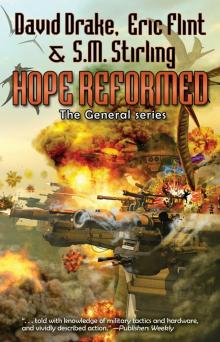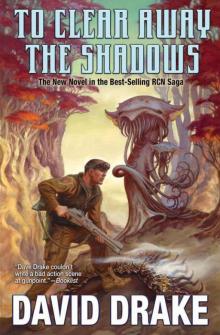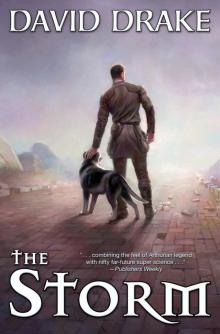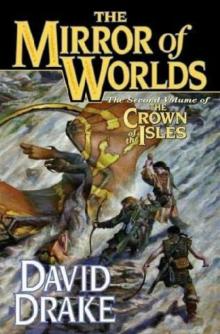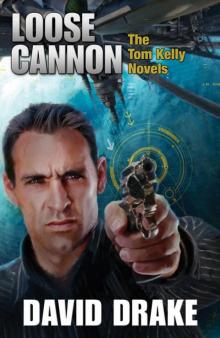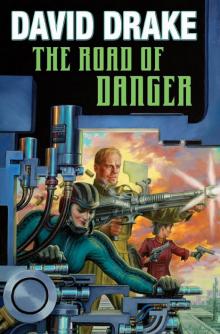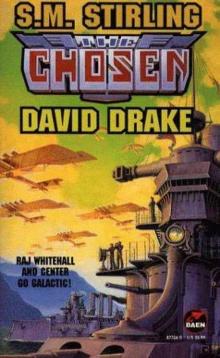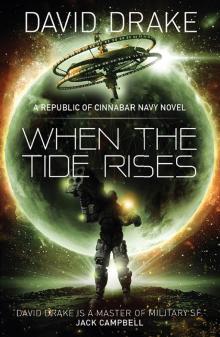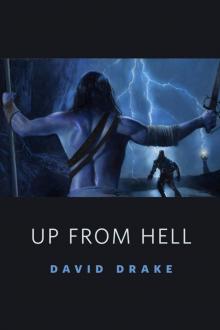Hope reformed, p.1
Hope Reformed, page 1





Table of Contents
VII: THE REFORMER BY DAVID DRAKE AND S.M. STIRLINGCHAPTER ONE
CHAPTER TWO
CHAPTER THREE
CHAPTER FOUR
CHAPTER FIVE
CHAPTER SIX
CHAPTER SEVEN
CHAPTER EIGHT
CHAPTER NINE
CHAPTER TEN
CHAPTER ELEVEN
CHAPTER TWELVE
CHAPTER THIRTEEN
EPILOGUE
MAPS
VIII: THE TYRANT BY DAVID DRAKE AND ERIC FLINTMAP
PART I: THE TRIUMVIRCHAPTER ONE
CHAPTER TWO
CHAPTER THREE
CHAPTER FOUR
CHAPTER FIVE
CHAPTER SIX
CHAPTER SEVEN
CHAPTER EIGHT
CHAPTER NINE
CHAPTER TEN
CHAPTER ELEVEN
CHAPTER TWELVE
CHAPTER THIRTEEN
CHAPTER FOURTEEN
CHAPTER FIFTEEN
PART II: THE CONQUERERCHAPTER SIXTEEN
CHAPTER SEVENTEEN
CHAPTER EIGHTEEN
CHAPTER NINETEEN
CHAPTER TWENTY
PART III: THE INVADERCHAPTER TWENTY-ONE
CHAPTER TWENTY-TWO
CHAPTER TWENTY-THREE
CHAPTER TWENTY-FOUR
CHAPTER TWENTY-FIVE
CHAPTER TWENTY-SIX
PART IV: THE DICTATORCHAPTER TWENTY-SEVEN
CHAPTER TWENTY-EIGHT
CHAPTER TWENTY-NINE
PART V: THE MAN ALONECHAPTER THIRTY
CHAPTER THIRTY-ONE
CHAPTER THIRTY-TWO
EPILOGUE
AFTERWORD
HOPE REFORMED
David Drake, Eric Flint, S.M. Stirling
Contains Books #7 and #8, The Reformer and The Tyrant, in the best selling General series
The Empire of Man has fallen and a new Dark Age is upon the stars. With planets cut off and reduced to subsistence and ignorance, humanity has nearly forgotten its past greatness. But one battle computer has survived the Collapse. He is Center. And Center is determined to find and aid leaders who can return a star-faring republic to the galaxy. The first of these leaders is Raj Whitehall, a man born to be a general, and molded to retake civilization itself from the jaws of barbarism.
The Reformer by S.M. Stirling and David Drake
On Hafardine, civilization had fallen further than most. That men came from the stars was not even a rumor of memory in Adrian Gellert's day. The Empire of Vanbret spread across the lands in a sterile splendor that could only end in another collapse, more ignominious and complete than the first. Adrian Gellert was a philosopher, a Student of the Grove. His greatest desire was a life of contemplation in the service of wisdom . . . until he touched the 'holy relic' that contained the disincarnate minds of Raj Whitehall and Center. On that day, Adrian's search for wisdom would lead him to a life of action, from the law-courts of Vanbret to the pirate cities of the Archipelago and battlefields bloodier than any in the history he'd learned. The prize was the future of humanity.
The Tyrant by Eric Flint and David Drake
On the planet Hafardine, civilization must rediscover progress or collapse. Adrian, guided by disembodied electronic mentors from space, has brought gunpowder and steam power to the Kingdom of the Isles to break the stranglehold of the Empire. But he will have to avoid being killed by the suspicious King he serves, by the barbarians he must recruit, and even by his insanely vengeful brother.
THE GENERAL SERIES
by David Drake
The Forge with S.M. Stirling
The Hammer with S.M. Stirling
The Anvil with S.M. Stirling
The Steel with S.M. Stirling
The Sword with S.M. Stirling
The Chosen with S.M. Stirling
The Reformer with S.M. Stirling
The Tyrant with Eric Flint
The Heretic with Tony Daniel
The Savior with Tony Daniel
OMNIBUS EDITIONS
Hope Reborn with S.M. Stirling
Hope Rearmed with S.M. Stirling
Hope Renewed with S.M. Stirling
Hope Reformed with S.M. Stirling and Eric Flint
HOPE REFORMED
This is a work of fiction. All the characters and events portrayed in this book are fictional, and any resemblance to real people or incidents is purely coincidental.
The Reformer copyright © 1999 by S.M. Stirling and David Drake.
The Tyrant copyright © 2002 by Eric Flint & David Drake.
All rights reserved, including the right to reproduce this book or portions thereof in any form.
A Baen Books Original
Baen Publishing Enterprises
P.O. Box 1403
Riverdale, NY 10471
www.baen.com
ISBN: 978-1-4767-3690-7
Cover art by Kurt Miller
First Baen paperback printing, November 2014
Distributed by Simon & Schuster
1230 Avenue of the Americas
New York, NY 10020
Library of Congress Cataloging-in-Publication Data
Drake, David, 1945-
Hope Reformed / David Drake, S.M. Stirling, [Eric Flint]
pages cm. -- (The General series ; 4)
ISBN 978-1-4767-3690-7 (paperback)
1. Science fiction. I. Stirling, S. M. II. Flint, Eric. III. Title.
PS3554.R196H68 2014
813'.54--dc23
2014032805
Printed in the United States of America
10 9 8 7 6 5 4 3 2 1
eISBN: 978-1-62579-326-3
Electronic Version by Baen Books
www.baen.com
To Marjorie Stirling
CHAPTER ONE
The High City of Solinga had been the core of the ancient town once; first a warlord’s castle, then the seat of the city council. Three centuries ago, when Solinga was capital of the Emerald League, several million arnkets of the League’s treasury had mysteriously found their way into a building program to turn it into a shrine to the city’s gods—to the Gray-Eyed Lady of the Stars, first and foremost.
Money well stolen and spent, Adrian Gellert thought, as the procession mounted the broad flight of marble stairs that led to the plateau. Right hand tucked into the snowy folds of his robe, left hand holding the gold-capped scroll that marked him as a Scholar of the Grove, he kept to the slow hieratic pace suitable for a religious occasion. About him gulls swooped and shrieked; before him stood the cream-white marble pillars, the golden roofs, the great forty-foot statue of the Maiden holding Her bronze-tipped spear aloft to guide the mariners home. Behind him was the tarry workaday reality of Solinga smelling of fish and offal and sea salt, narrow crooked streets and whitewashed walls peeling to show the mud brick, tile roofs and only occasionally the walls and colonnades and courtyard gardens of the rich. But here, amid the scent of incense and the light silvery tones of hand bells, was the ideal the reality served.
We may have fallen from our forefathers’ power, but this at least we can say—that we alone gave godlike things to the gods, he thought with a melancholy pride that edged out the anxiety and grief of his father’s funeral.
The procession halted as a priest confronted them, a blue-edged fold of his blanketlike mantle over his head like a hood. “Why do you come to this holy place?”
“To render homage to the Goddess, in such seemly wise as is allowed to mortal men,” Adrian’s uncle said, speaking as the eldest adult male of the Gellert clan. Besides, he was paying for the ceremony. “In memory of Ektar Gellert, a free citizen of this city, that the Maiden may judge him kindly; and in the name of his sons, Esmond and Adrian Gellert, that She may watch over them in the trials of life.”
“Come, then, and do worship.”
The procession resumed; Adrian, his brother Esmond, uncles, cousins, grandfathers, hangers-on, with hired musicians following behind playing double-pipes and lyres. Pilgrims and priests and citizens making sacrifice parted before them. Their sandals scuffed across the pavement, slabs of white-veined green marble edged with gold. They passed the Plinth of Victories, a huge column set with the beaks of captured warships; past the black-basalt fane of Wodep the War God, the pink and gold marble of Etat the All-Father, and at last to the great raised rectangle of the Maiden’s fane. It was a simple affair of giant white columns, each ending in a riot of golden acanthus leaves. The roof was copper-green tiles, and all around from pediment to architrave ran mosaic panels done in gold glass, lapis, amber and semiprecious stones. Some showed the Goddess giving Her gifts to men—fire, the plow, the olive, ships, the art of writing. Others were scenes from the Five Year Festival, the city’s knights on their velipads, the Year Maidens bringing the great embroidered shawl, the athletes naked in their iron pride.
“Follow, then,” the priest said.
Hot charcoal fires burned in a pair of tall tripods of fretted bronze. Gravely, Esmond and Adrian strode up the steps. Each took a silver bowl from the acolytes, pouring a stream of translucent grains into the white-glowing bed. Fragrant smoke rose, bitter and spicy.
The others drew up a fold of their mantles to cover their heads as the priest raised his hands; the Goddess’ moon was visible over the horns of the roof, the other two moons being below the horizon at this hour. Adrian’s uncle led the sacrifice forward, a white-feathered greatbeast with four gilded horns and a myrtle wreath around
Slowly, the tall ebony and silver doors of the temple slid open, rolling soundlessly on bronze bearings. Adrian’s mind reflexively murmured three citations and an epic poem on the building of the Maiden’s Temple; all of them described the effect, and all of them inaccurately as far as he knew. The cult image came forth on brass rails set into the marble of the pronacs floor, gliding with oil-bath smoothness. It was hidden in a tall cedarwood and silver shrine, emblazoned with the full moon on all sides. At a touch the sides sank down to reveal a rock. Black, slagged and metallic-looking in spots with a trace of rust, a metorite and very ancient.
Adrian Gellert had long since been trained in the precepts of the Grove; that God was Number and Form, and all the lesser images merely avatars or imaginings of men unable to conceive of the One. God did not need to Do, only to Be—but he still felt a trace of numinous awe as he extended his hand. And of course a gentleman showed respect for the ancient cults.
“Scholar of the Grove—”
Adrian held up the scroll in his left hand.
“Scholar of the Blade—”
His brother Esmond raised his sheathed sword.
“Receive the blessing of the Goddess, your patron.”
Adrian closed his eyes and let the hand rest on the sacred rock. It was cool, cooler than it should have been, and—
Where am I? Where am I?
He thought he screamed the words, but he had no lungs. No eyes, for surely even the darkest night at the bottom of the silver mines of Flowerhill was brighter than this. He was nothing but Fear, adrift in a world of midnight. Stroke. Heart attack.
Compose yourself, he thought sharply. Remember that anything that can happen, can happen to you. All men are initiates of the mysteries of death.
That was the comfort of philosophy, but a little hard to remember when one was only twenty-one.
Light. He blinked . . . and saw a room around him. Furnished in an alien style, strange padded furniture, a fire burning in an enclosed brick space in one wall, tables and chairs of subtly foreign make. And a man standing there, a dark man with bowl-cut black hair. Odd clothes, something like those worn in the Western Isles, or even among the Southron barbarians; trousers, those marks of the savage, a curious tailored coat of blue with tails dangling behind. A curved sword and a holster with something rather like a carpenter’s tool were lying on one table.
Either I have gone mad, or something very strange has happened, Adrian thought. He was conscious of his own terror, but it was distant, muted. He looked down at himself, and he was there again—not in the snowy draped robe of ceremony, but in an everyday tunic, with inkhorn and pen case slung from his belt.
“Adrian Gellert,” the oddly-dressed man said; he spoke good Emerald, with a hint of a soft accent. “What is it that you desire?”
It was the manner of the Academy to teach with questions. He closed his lips on his own enquiries, on the fleeting ephemeral desires of every day, on the anxieties of his father’s untimely death. That question had asked for truth. Perhaps there was truth in the old stories of Divine intervention in the lives of men.
“I want to know,” he blurted.
The dark man nodded.
“An excellent dinner. Many thanks, Samul,” Esmond said, from his couch across the table.
Adrian nodded and murmured something. His brother-in-law Samul Mcson had been a catch for his sister Alzabeta. A catch of sorts; the Mcson family was important in the dye trade and had a fish-sauce works whose products were sold by name as far away as Vanbert, the Confederacy capital. He’d never liked the man, and the sneer on the heavy fleshy features showed the feeling was returned. Also there was honey-glaze sauce on the front of his robe, which was rose-colored silk from the Western Isles. Probably brought back on one of Father’s ships, he thought, smiling and nodding at his surly relative by marriage.
The servants—Mcson retainers as well, since the Gellert retainers were dispersed—cleared away the fruits and pastries and cheeses; the dinner had been the traditional seven courses, from nuts to apples. Restrained, at least by Confederacy standards; the simple tastes of the antique Emeralds only survived in Cadet training and the Academy’s dining halls. The broken meats and scraps would be distributed at the door to the city’s poor, who gathered whenever the garlanded head of a greatbeast was hung over a door to mark a household that had made sacrifice.
Adrian dipped water into his wine and poured a small libation on the mats set out on the tile floor. He suppressed a stab of unphilosophic anger at his father for dying at such an inopportune time; the business had been going well enough, but the capital was all in goodwill, contacts and ongoing trade, and neither of the Gellert sons were inclined to take up the shipping business to the Western Isles. Their father wouldn’t have heard of it, anyway; what had all his ignoble labor been for, if not to buy his sons the leisure to be scholars and athletes, gentlemen of Solinga, greatest of the Emerald cities? But he’d died too early. By themselves the physical assets were barely enough to cover the debts, dower their youngest sister and provide a modest but decent living for their mother. The younger Gellerts would have to cut short their education and find their own way in the world.
He looked around the room; two dozen guests reclining on the couches, some of them rented for the occasion. It was the men’s summer dining room, open to the garden on one side, with old-fashioned murals of game and fish and fruit on the walls. Scents of rose and jasmine blew in from the darkness of the courtyard, and the sweet tinkle of water in a fountain. Most of the guests were older men, friends or business acquaintances of his father. Esmond lay on one elbow across from him, his mantle falling back, exposing the hard muscle of his chest and arm, tanned to the color of old beechwood. It made the corn-gold of his hair more vivid as it spilled down his back; a rare color for an Emerald, and the only thing besides blue eyes he and his brother had in common physically.
I’m weedy, in fact, Adrian thought. Short, at least, and only middling competent in the athletic part of the two-year course of Cadet training every well-born Solingian youth had to take when he turned eighteen. Once it had been preparation for military service, but that had ceased to be important long ago, in his great-grandfather’s time, when the Confederacy’s armies had conquered the Emerald lands.
The servants brought in another two jugs of wine, yard-high things with double looping handles and pointed bottoms. They splashed into the great bulbous mixer; light from the oil lamps flickered on the cheerful feasting scene painted across its ruddy pottery. Not much like tonight’s memorial dinner; no flute-girls or dancers or acrobats here, since it wouldn’t be seemly. His father hadn’t hired such for most of his parties. These things are for men with no conversation. He smiled slightly, remembering the deep gravel voice and the face weathered by twenty years of sea weather and spray.
“Excuse me,” he murmured. Three parts wine to one of water now, and the talk grew louder.
The garden was warm and still, starlight and two of the moons showing the brick pathways between beds of herbs and flowers. Not very large, only fifty paces on a side, but tall cypress trees stood around the perimeter wall, throwing pools of stygian blackness. The pool and fountain shone silver; he could see the mouths and tentacles of the ornamental swimmers breaking the surface, hoping for a few crumbs of bread as he passed. Down towards the end of the garden was a little pergola, an archway of withes covered in a flowering vine, with a stone seat beneath and a mask of the Goddess in Her aspect as patron of wisdom set in the wall behind.

